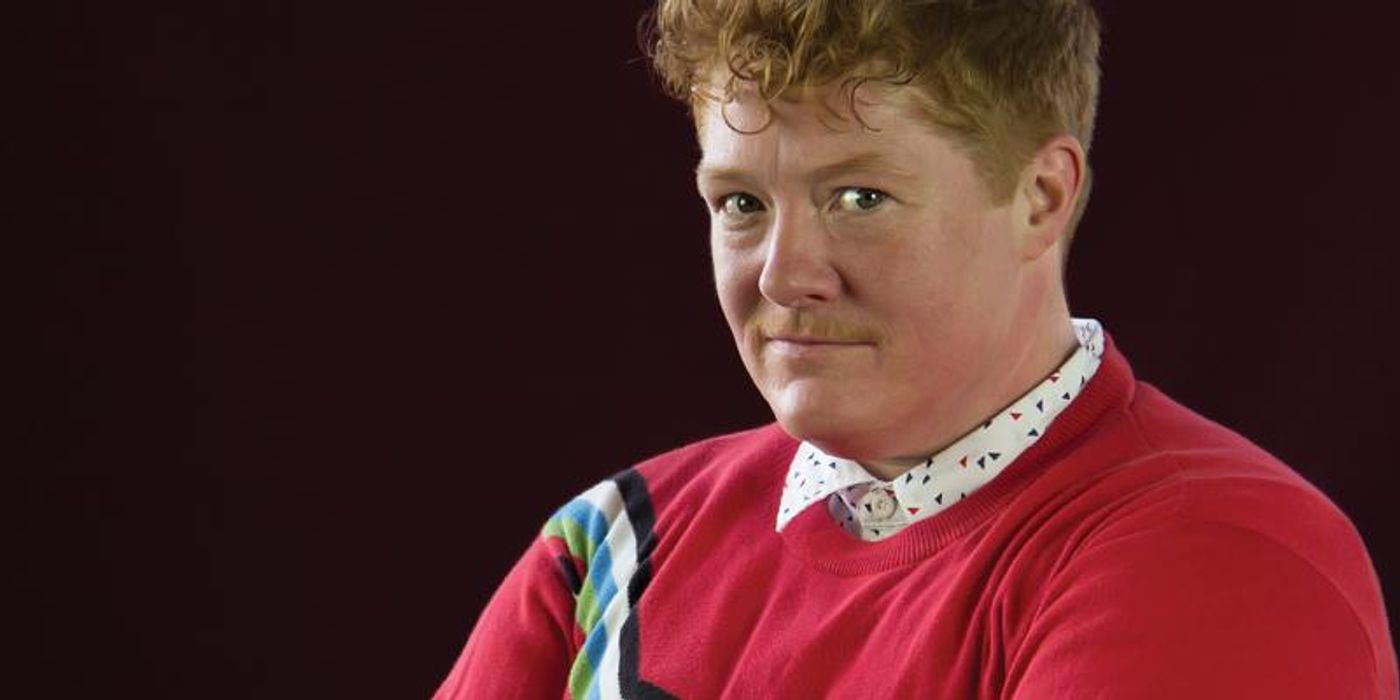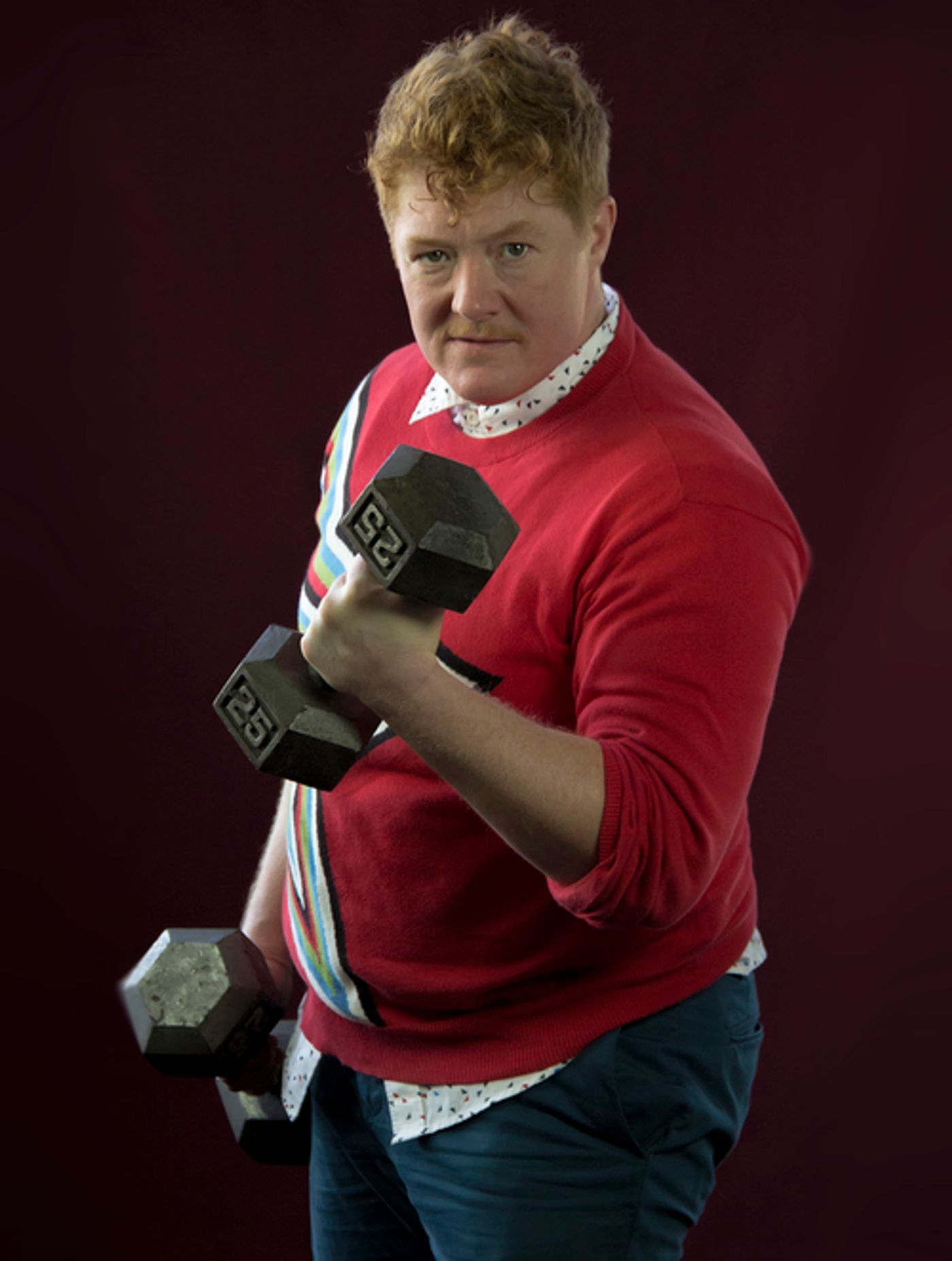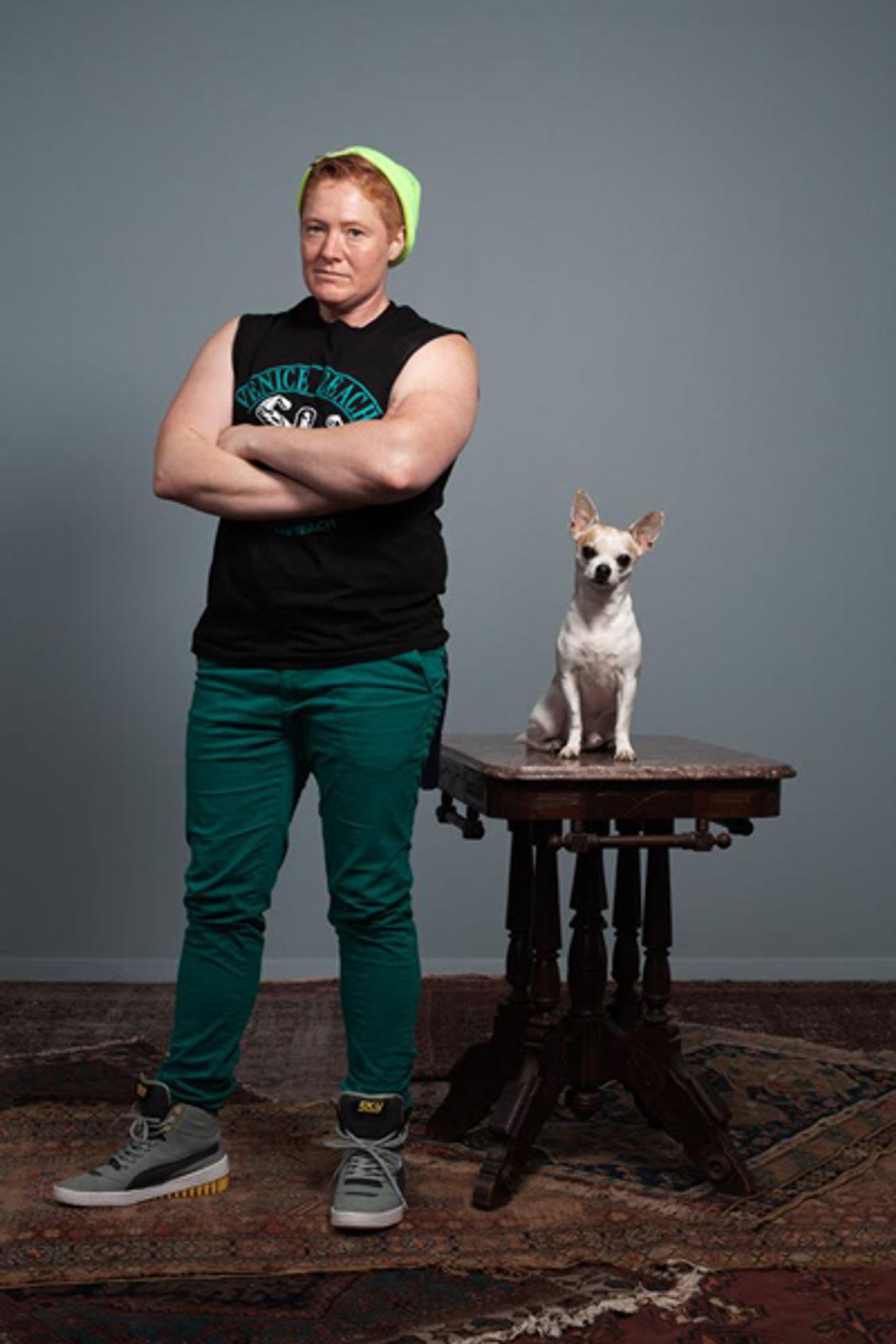Interview: Becca Blackwell Talks THEY, THEMSELF AND SCHMERM, Mining Humor from Difficult Topics, and the Butterfly Effect of Queer Artists

"You're never going to see yourself onstage unless you write for yourself."
That's what Becca Blackwell was told by their friend, Michelle Matlock, who had written THE MAMMY PROJECT as a solo show for herself. That idea, coupled with encouragement from Blackwell's partner and "prolific" fellow artist, Erin Markey, led Blackwell to write THEY, THEMSELF AND SCHMERM.
The solo show and its title were inspired in part by Corey Haim's "strange PR documentary," ME, MYSELF AND I, from the late '80s. "It was so strange and awkward and weird and wonderful, that I was like, 'Wow, this is really inspiring,' and I used it as a container to write about," Blackwell explains. "It was very obvious he was suffering from drug problems, and he was very sexually abused. As someone who also had been sexually abused, I could really read that in him."
In the comedy show, Blackwell mines humor from her life story, covering subject matter like childhood sexual abuse and transitioning while ensuring it isn't "too precious and reverent." Although the show was designed to feature some video work, including homages to the Haim documentary, THEY, THEMSELF AND SCHMERM has evolved since that first performance, taking on more of a stand-up vibe.
With the show returning to Joe's Pub for a pair of performances at the tail end of Pride month, we spoke with Blackwell over the phone about the inspiration for their show, finding the joke in complicated topics, and being both George and Martha.
This interview has been edited for length and content.
TF: Had you not seen the Corey Haim documentary until a few years ago?
BB: Yeah. Erin [Markey] kept saying to me, "Just write what you're interested in." I was like, "I don't know what I'm interested in. It changes every day." My obsession is very much dark... I would always love watching documentaries on people who were addicted to crystal meth because I was just like, "How does one go to that place?"
When I saw [ME, MYSELF AND I], I was just like, "Oh my god, here's this PR, like, hopeful machine, trying to change this view of him." It was right when he was getting in a lot of trouble after LOST BOYS, and it was just like this strange attempt to make him look like a normal boy. And it was so obviously done by gay men, and he was obviously just this pawn to them. I don't know, it was just so tragic and sad.
TF: Obviously, the biggest difference between your show and that would be that you actually address your actual life. What made you decide to incorporate that into the structure of the show while also doing something that's kind of the inverse of it?
BB: I think I just had a lot of sympathy, and I also just was like, "I don't know how to talk about these things, like sexual abuse, drug abuse, just this whole system of this business that we're in, the entertainment business that literally destroys people inside of it. When I was a bull dyke, or being read as a bull dyke, there was nothing that anyone in the business could do with me. But then when I started reading trans, all of a sudden, I think there was a movement for it, and, also, when you look passable in one gender or another, it's way more comforting to people. People know what they can do with you more. I think I was like, "How do I talk about these things using that container and then also bring humor to it?"
It has lost that a little bit. Now it's a little more [of a] standup-y, storytelling thing. I never know if I want to keep the video I made that's a little bit of an homage to him in that film. It's like a hat-tip, that if you hadn't seen it, you would just be like, "This is a weird '90s strange thing." I really grapple with cutting that because it's almost my own thank-you to him.
TF: You deal with childhood sexual abuse in the show. In one of the previews that I saw, you make a few jokes and then you address that maybe only the people who've had that same experience might feel comfortable laughing. When you were putting it together, was that really conscious in your mind?
BB: Sure... With that [subject matter], I had someone come up to me after one of my shows... and they were like, "I never thought I would laugh at something like that." They were probably in their early twenties, and they were like, "It was just so relieving... I just never would've felt like, 'Oh, isn't this neat? I feel special in a way I never thought that this thing could make me feel special.'"

For me, it was this thing of, oh, there's nothing wrong or right about any of the way we all have had lives. It's really just the way we take that experience and how do we want to focus it. [Do we want to] focus it on "I've been a victim, I've been hurt all the time," or is it going to be... it is like the whole, really cliched, "I'm going to make f-ing spicy lemonade out of this motherfucker." I think it's easy to say on the other side of it. On the other side of making the show, if someone would've said this kind of stuff to me I would've been like, "Oh, fuck off."
But you realize that when you do take empowerment over whatever happens to you--- I could have a guy next to me saying all that he wants, like, "You're not a man," or, "You're not this or that," and I'm like, "Do I really care what he thinks?" So, it's like, "How do I take that power away from everyone else about my own story, about my own narrative?" I'm supposed to be all fucked up because I was sexually abused, and I'm like, "No, I'm actually a f-ing tough-ass motherfucker. And I'm still alive, and that I have functioning relationships and that I'm able to love and that I'm able to create." That's what I ended up saying to that person. They kind of brought this out of me. I needed them as much as they might have said they needed me in that moment.
TF: On the flip side of that, were there conversations with your collaborators or even just with yourself about how much to include about your past?
BB: Oh yeah, many conversations. I still was really afraid... there's still a part of me that thinks I'm going to get in trouble. There are a lot of specifics. There are people [who are] still alive, and I get afraid of liability; I still have that fear. So, it's not like I'm some person on the other side of everything, like, "Yep, everything's great. I make a million dollars a week and nothing bothers me." I still have this fear...
I wasn't also interested in doing some kind of sick, "And then this happened, and then this happened." It just felt gratuitous, so I was just like, what can I say that's dark and funny and says these things that everyone's like, "Oh my god," and make them laugh? Then we can be more playful inside of the next step of coming together.
What was helpful for it was also the process. I realized there is still some stuff that's residual that I have pain about. What's hard is when I talk to people after the show and they're like, "I want to talk about my sexual abuse in my work." My first instinct is like, "DON'T! (Laughs) "Don't don't don't don't don't don't." I did it as a way of like, no one ever talked about it, so I would always joke about it. I wanted to take back the night in a weird fucked-up way.
TF: You mentioned earlier that the show is a little more frank or less precious when it comes to being trans and talking about gender. How intentional was that and how much is that just your sensibility?
BB: I definitely would say it's my sensibility. I actually am always scared to do my show around young people or like a college setting sometimes, because I think, "I'm going to say some real doozies." A couple times I've done the show and it's taken me the first 10 minutes, and I look at the audience, and kids' mouths are agasp, like, "You're not allowed to say that!" You know, I say stuff like, "Well, you guys probably don't even know what a bull dyke is because no one's strong enough to be a masculine woman around here. Everyone's queer or a 'they.'" And I'm like, "I wasn't strong enough to be a bull dyke either." I go, "There's only like seven left." It's politically incorrect, but I also think there is a little bit of thin skin at times, I feel, where I'm like, "C'mon, guys." Even nature is a little f-ing ass-kicking. It's just the way it is. You've got to fight. I mean, birth is violent. When you watch a flower bloom, it's painful for the flower, you know, but it's beautiful. So, it's like that kind of concept. I just grew up in the time where there wasn't Change.org to f-ing write and destroy some business because they didn't call you the right gender. My gender identity was DontGetYourAssKicked.com (laughs).
TF: Is there one particular conversation about the trans community or the LGBTQ community at large that you think isn't being addressed, that really needs confronting right now?
BB: When we start revering what female or feminine people think and feel and how they see the world and how they participate in the world and we see it as valuable as male and masculine [people]---I think this is in the trans community as well as in the queer community, in the world community---a lot of things will get [better] because we will want those people at the table in terms of how we create communities that are more inclusive. If we start really asking for different kinds of concepts and ideas and ways to go about things, as opposed to very male or masculine ways, then I think we'll start to see a lot of things open up in terms of a lot of our struggles.

But I think there is something that is important about feminine energy, in terms of reflection and receiving, and these are really powerful things. I do feel like we don't pay attention to them a lot. I also feel like I was a bad feminist because I wasn't able to be a masculine woman in the world---because I feel like that's really important because it does bring those two kinds of things together---the way that, I think, effeminate men do. And it's threatening. They tend to get a lot of shit because being a man is still seen as being more powerful than being a woman, but then when you're an effeminate man, a lot of men freak out. A masculine woman is more invisible because a woman's currency in the world, unfortunately, is if she's fuckable to men. So, if you're a masculine woman, you're a little more on the invisible radar. My friend said to me once a long time ago, "There will never be true equal gay rights until we see women as equal to men. He's right.
TF: While acknowledging that we're all imperfect, I think there's real power in what you're doing, sort of interrogating the either-and-bothness of all of it.
BB: Yeah, I think I do like sitting in those places because there are some days I feel like I'm f-ing Juuuuuu-dy, and then there are some days that I'm Rock Hudson, but I think Rock Hudson and Judy are the same person. (Laughs) Martha and George, how 'bout that? Some days I wake up, and I'm, "Rubbing alcohol for you, darling?" And some days I'm very, "Never mix, never worry." (Laughs) But I'm always gay; that I do know.TF: In the documentary, Corey Haim says one of his role models is John Ritter. In the spirit of Pride, growing up, did you have any queer role models that you looked to?
BB: As a child, I was obsessed with Janis Joplin, and I remember being really upset to know that she could never be my birth mother because she died before I was born. She was pretty queer-ish. I saw MONDO NEW YORK in the '80s, and I remember Joey Arias and Dean Johnson were these people in these films that I saw, and I was like, "Oh my god, they're amazing. They're these incredible performers. I'm going to be in New York, you know, making weird-ass art." The thing that saved my life was Jennifer Miller in Circus Amok, which was this queer circus, and she was this woman with a beard. I think it's so amazing where we're at now in terms of gender and stuff, and she was definitely ahead of her game. Peggy Shaw, when I saw [A MENOPAUSAL GENTLEMAN] in '96 or '95, it blew me away because here was this butch person that was like, "Sean Penn looks like me."
I mean, everyone who's queer, even if I've met them or not or seen their work, has shaped who I am as they're walking through the world. We're all butterfly effect-ing each other in terms of visibility and queerness and all this stuff, so I'm appreciative of it all.
Becca Blackwell's THEY, THEMSELF AND SCHMERM returns to Joe's Pub on Sunday, June 24 and Tuesday, June 26. For tickets and information, visit www.joespub.publictheater.org.
Troy Frisby is an entertainment writer and digital news producer based in New York. Follow him on Twitter @TroyFrisby.
Videos


